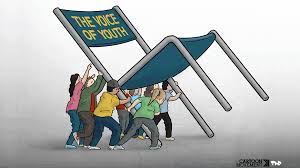The political landscape of India is witnessing a significant shift with the increasing involvement of young leaders and youth-centric movements. This wave of fresh energy and new ideas is reshaping the way politics is perceived and practiced across the country.
1. Why Youth Participation Matters
Young people bring innovation, passion, and a fresh perspective to politics. Their involvement ensures that issues relevant to the younger generation—such as education, employment, climate change, and digital rights—are front and center in policy discussions.
2. Notable Young Leaders Making an Impact
- Tejasvi Surya (BJP): Known for his articulate speeches and active social media presence, he represents a new generation of political leaders blending traditional politics with modern communication.
- Chandrani Murmu (BJD): At 25, she became the youngest Member of Parliament in 2019, highlighting the rise of youth in regional politics.
- Priyanka Tibrewal and other youth activists have mobilized social campaigns around education and environmental issues.
3. Youth-Led Movements and Their Influence
Movements such as the anti-corruption protests, climate action groups like Fridays for Future India, and student unions have amplified the political voice of youth, pushing governments to address systemic issues.
4. Challenges Faced by Youth in Politics
Despite enthusiasm, young politicians often face hurdles such as lack of experience, resistance from established party hierarchies, and limited resources. Overcoming these challenges requires structural reforms and mentorship programs.
5. The Digital Advantage
Social media platforms have democratized political engagement, enabling young leaders to connect directly with constituents, mobilize support, and challenge traditional gatekeepers.
Conclusion
The rising voices of youth in Indian politics promise a dynamic and inclusive future. Their active participation not only enriches democracy but also ensures that the policies reflect the aspirations of a rapidly changing society.
































































